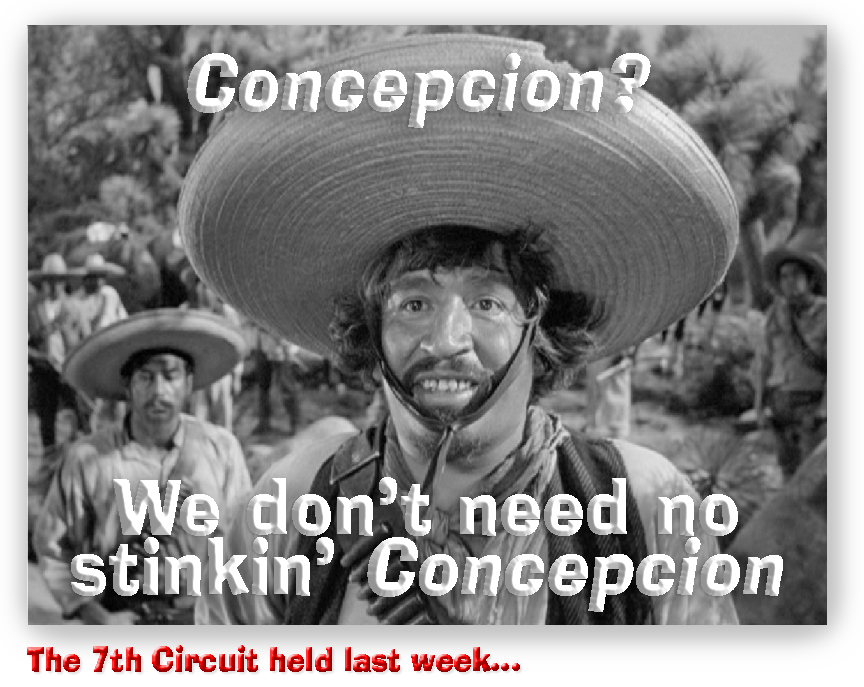We post news and comment on federal criminal justice issues, focused primarily on trial and post-conviction matters, legislative initiatives, and sentencing issues.

‘CONCEPCION’? WHAT ‘CONCEPCION?’ 7TH CIRCUIT ASKS
When the Supreme Court handed down the Concepcion v. United States decision a few weeks ago, I thought that the holding – that district courts’ discretion to consider any relevant information in resentencing is bounded only when Congress or the Constitution expressly limits the type of information a district court may consider in modifying a sentence – would resolve a circuit split surrounding what factors can serve as the basis for compassionate release.
 I was especially focused on cases in which courts were asked to rely on non-retroactive changes in sentencing law – such as the First Step Act’s ban on § 924(c) “stacking” – as a basis for compassionate release. After all, nothing in the text of 18 USC § 3582(c)(1)(a) supports the notion that non-retroactive changes are excluded from being “extraordinary and compelling.”
I was especially focused on cases in which courts were asked to rely on non-retroactive changes in sentencing law – such as the First Step Act’s ban on § 924(c) “stacking” – as a basis for compassionate release. After all, nothing in the text of 18 USC § 3582(c)(1)(a) supports the notion that non-retroactive changes are excluded from being “extraordinary and compelling.”
Who could possibly disagree?
The 7th Circuit, maybe. Last week, that Circuit rejected reliance on non-retroactive changes in statute as a basis for compassionate release. Christopher King was serving a mandatory minimum sentence for drug distribution that had been lowered by the First Step Act. He argued the statutory change – while not retroactive – was an extraordinary and compelling reason for a sentence reduction.
 The 7th disagreed, holding that when deciding whether “extraordinary and compelling reasons” justify a prisoner’s compassionate release, judges must not rely on non-retroactive statutory changes or new judicial decisions.” The Circuit ruled that “there’s nothing ‘extraordinary’ about new statutes or caselaw, or a contention that the sentencing judge erred in applying the Guidelines; these are the ordinary business of the legal system, and their consequences should be addressed by direct appeal or collateral review under 28 U.S.C. § 2255.”
The 7th disagreed, holding that when deciding whether “extraordinary and compelling reasons” justify a prisoner’s compassionate release, judges must not rely on non-retroactive statutory changes or new judicial decisions.” The Circuit ruled that “there’s nothing ‘extraordinary’ about new statutes or caselaw, or a contention that the sentencing judge erred in applying the Guidelines; these are the ordinary business of the legal system, and their consequences should be addressed by direct appeal or collateral review under 28 U.S.C. § 2255.”
The 7th observed that
Concepcion… held that, when substantive changes made by the First Step Act (principally reductions in the authorized ranges for crack-cocaine crimes) entitle a prisoner to be resentenced, the judge may consider everything that would have been pertinent at an original sentencing. We may assume that the same would be true if a district judge were to vacate a sentence on application for compassionate release and hold a full resentencing proceeding. But… the threshold question [is] whether the prisoner is entitled to a reduction under § 3582(c)(1)(A)… The First Step Act did not create or modify the “extraordinary and compelling reasons” threshold for eligibility; it just added prisoners to the list of persons who may file motions. We take the Supreme Court at its word that Concepcion is about the matters that district judges may consider when they resentence defendants. So understood, Concepcion is irrelevant to the threshold question whether any given prisoner has established an “extraordinary and compelling” reason for release.
 Writing in his Sentencing Law and Policy blog, Ohio State law professor Doug Berman quite rightly complained, “[T]his new King decision reiterates the misguided notion that district judges are categorically excluded from ever considering ‘non-retroactive statutory changes or new judicial decisions’ even though Concepcion stressed that the ‘only limitations on a court’s discretion to consider any relevant materials at an initial sentencing or in modifying that sentence are those set forth by Congress in a statute or by the Constitution.”
Writing in his Sentencing Law and Policy blog, Ohio State law professor Doug Berman quite rightly complained, “[T]his new King decision reiterates the misguided notion that district judges are categorically excluded from ever considering ‘non-retroactive statutory changes or new judicial decisions’ even though Concepcion stressed that the ‘only limitations on a court’s discretion to consider any relevant materials at an initial sentencing or in modifying that sentence are those set forth by Congress in a statute or by the Constitution.”
Concepcion v. United States, Case No 20-1650 (Supreme Court, June 27, 2022)
United States v. King, Case No 21-3196, 2022 U.S.App. LEXIS 18987 (7th Cir., July 11, 2022)
Sentencing Law and Policy, Seventh Circuit panel refuses to reconsider its extra-textual limit on compassionate release in light of Supreme Court’s Concepcion decision (July 11, 2022)
– Thomas L. Root

